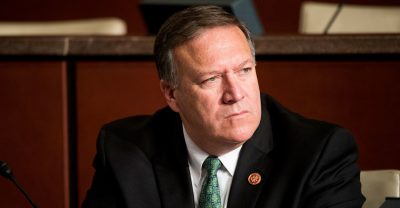Venezuela: Canada Imposes Fresh Sanctions as Pompeo Vows to ‘Tighten Noose’
US Secretary of State Mike Pompeo and the Lima Group have pledged more sanctions against Venezuela.

Ottawa imposed sanctions on 43 Venezuelan officials Wednesday, according to a statement by Canadian Foreign Minister Chrystia Freeland.
While the statement did not specify the names of those targeted, Freeland indicated that they were “high-ranking officials” or “governors.”
“Canada is committed to supporting the peaceful restoration of constitutional democracy in Venezuela,” she added.
Previous Canadian sanctions had targeted a total of 70 Venezuelan officials.
The measures by the Trudeau government come on the heels of successive rounds of sanctions imposed against Caracas by the US Treasury’s Office of Foreign Assets Control (OFAC). After sanctioning Venezuela’s oil, mining and banking sectors, Washington has recently gone after vessels and cargo companies involved in Venezuelan oil shipments. The latest round targeted four shipping companies and nine vessels on Friday.
Sanctions occupied the limelight ata Lima Group summit held in Santiago, Chile, on Monday. The meeting, which was not attended by Mexico, ended with a joint statement by participating countries. While the declaration rejected “any threat or course of action leading to a military intervention,” it did call on the international community to continue imposing sanctions against Venezuela. The statement additionally calls for an “International Conference for Democracy,” to be held in Lima at a later date.
US-led sanctions have met growing international opposition, with many experts warning that the measures are exacerbating the Caribbean country’s current crisis by depriving the cash-strapped Venezuelan state of resources and imposing hurdles on transactions such as food and medicine imports. UN Special Rapporteur Idriss Jazairy has criticized the use of sanctions to promote regime change, while former UN Expert Alfred de Zayas likened sanctions to “medieval sieges,” meant to bring countries “to their knees.”
The latest sanctions coincided with a South American trip by US Secretary of State Mike Pompeo, who visited Chile, Paraguay, Peru and Colombia in the past week. Venezuela was one of the main topics on the agenda, as well as Chinese investments in Latin America.
Pompeo’s last stop was the Colombian town of Cucuta, right on the border with Venezuela, where he met Colombian President Ivan Duque and Venezuelan opposition leaders such as Julio Borges. Borges is wanted by Venezuelan judicial authorities for his alleged involvement in the drone assassination attempt against President Maduro on August 4, 2018.
Speaking in Cucuta on Sunday, Pompeo vowed to use “every economic and political means at our disposal,” including sanctions, to hold the “regime” accountable.
“You watch the political and diplomatic noose tighten around Maduro’s neck,” he told reporters before going back to the US.
Pompeo’s trip also featured warnings against Cuba, Russia and China for their support for the Maduro government. The secretary of state warned Havana and Moscow that there would be a “cost” for supporting Maduro, while also criticizing China’s presence in Latin America throughout the trip, calling it “nefarious.”
Beijing rebuked Pompeo’s comments on Monday, with Chinese Ambassador to Chile Xu Bu telling a local newspaper that Pompeo had “lost his mind.”
Chinese Foreign Ministry Spokesman Lu Kang blasted Pompeo’s “groundless allegations,” adding that “the US has long been treating Latin America as its backyard, where it would resort to willful use of pressure, threat or even subversion.”
Meanwhile, both Chavismo and the opposition staged mobilizations during the weekend.
Self-proclaimed “Interim president” Juan Guaido held a three day tour of the country’s northwest, holding rallies in the states of Falcón and Zulia. Guaido asked his followers to be “confident,” while also pledging that the end of the “usurpation” was just days away.
“You are not alone in this struggle, the international community is behind you and we are not going to lose,” he told a crowd in Punto Fijo.
Western states such as Zulia, home to Venezuela’s second largest city, Maracaibo, have been particularly hard hit by the recent electricity crisis, taking days to see power restored following nationwide blackouts and only having a few hours of service at a time.
Venezuela’s electric grid has been plagued by under-investment and lack of maintenance, problems which have been compounded by US sanctions. States such as Zulia had plans to install thermoelectric plants so as to reduce the dependence on the Guri Dam, the country’s main electricity generator, but sanctions have ground plans to a halt, particularly through shortages of fuel necessary to activate the plants.

Chavismo held a march on April 13 to commemorate the defeat of the 2002 coup (@PartidoPSUV)
For its part, Chavismo held a rally in Caracas on Saturday to commemorate the defeat of the 2002 coup which removed Chavez from power for 47 hours. The coup was led by opposition figures such as Leopoldo Lopez and Henrique Capriles, placing business leader Pedro Carmona as interim president, before a massive popular response brought Chavez back to power.
The date also marks the anniversary of the Bolivarian Militia, a popular defense organization created in 2009 and which has a reported 2 million members.
In his speech, Maduro pointed out that many of those who led the coup are high-profile opposition figures today, while also drawing parallels between Carmona’s swearing in and Juan Guaido’s self-proclamation on January 23.
*
Note to readers: please click the share buttons below. Forward this article to your email lists. Crosspost on your blog site, internet forums. etc.

